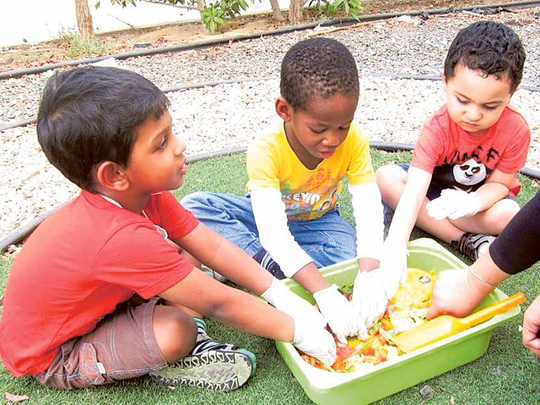
Dubai: In a city like Dubai that boasts an abundance of restaurants and immense variety in terms of cuisines and food options, it can be a challenge to make children understand the importance of reducing food wastage.
It is this very concern that civic authorities and some schools in the city are looking to address through an initiative that seeks to ensure that children do not grow up to become “food wasters”.
Dubai Municipality’s Waste Management Department has been conducting awareness campaigns and workshops in schools to reduce food wastage.
The department recently supplied public schools with compost boxes so that leftover food can be turned into fertiliser for school gardens, the Director of the Department, Abdul Majeed Al Saifaie, told Gulf News.
“During Ramadan, we are running another campaign on smart shopping, which says ‘stop stocking and spoiling’… People should get rid of the idea of stocking, especially organic materials. Similarly, parents shouldn’t put more than what is required in kids’ lunch boxes,” he said.
The ‘My City… My Environment’ initiative of the department encourages families to segregate waste for recycling and put organic waste in black bins given to households.
Lovita Tariq, founder and director of Kids World Nursery, a Montessori group operating four branches in the UAE, says that the preschool years are the most crucial to teaching children about issues such as food wastage, as social, cognitive and physical skills tend to develop rapidly at this stage.
“For us to create a caring world, we must start with the next generation, especially at the preschool years – as they are the most willing to learn and change. This is why we encourage our children in their own small ways to respect the food and environment that sustains them.”
She said the nursery works with toddlers on reusing the food that they waste. “We encourage parents to send children smaller portions of food, and cut them into pieces such as sliced apples, sandwiches and biscuits. We set a good example by teaching children the importance of food and explaining to them how lucky they are to eat every day. We compost our leftover food and use the manure to grow plants around our nurseries. We also share and donate packaged food that is extra from events and parties with workers around our communities.”
If children learn to value food at a young age, they are more likely to grow up to have good eating habits and waste less of their food, says Ryan Ewaskiw, Deputy Head of Primary at Jumeira Baccalaureate School, a Taaleem school.
“Therefore, we build this into our learning units in a variety of ways to study areas such as sustainability, food production and wastage,” he said.
The school organises visits to farms and supermarkets so students learn about crops and animals, food production, packaging and labelling. It also plants a garden and window herbs.
“Teaching children about portion size is a critical piece and begins with students’ snack and lunch that is either packed at home or purchased in our canteen. Lunch boxes are monitored daily by our school staff and our ‘Healthy Eating Star of the Week’ feature ensures that students focus not only on what is brought to school but the reasons why they should eat everything,” said Ewaskiw.
End of term parties and birthday parties are a key time to reflect upon food waste, he said. “Teachers take pictures so students see the amount of unused food items, boxes, containers, and plastic cutlery and cups and encourage our students to do some investigating.”
The school’s nurse has also helped develop a composting initiative called Bokashi box programme to create compost material for plants.
What schools can do to cut food wastage
Dubai: Teaching children to reduce food wastage is an issue that needs a consistent approach, says Kephren Sherry, Head of Infants at The Arcadia Preparatory School, a British primary school in Dubai.
There are various ways in which schools can encourage students to minimise food wastage and they can try and implement at least some of the following methods, says Sherry.
- The curriculum should include modules both within the Social Studies programme and across other subjects that teach children about where food comes from.
- Pupils need to be taught about farming communities who rely on the sale of food produce, about hunger in the world and the value of food banks and other systems to minimise food wastage.
- Schools might also forge strategic partnerships with food companies that share ideals about working towards eliminating food wastage.
- Teachers can be role models for good eating habits in school, beginning with making sensible, healthy choices and taking appropriate meal portions from the school canteen, which will help to minimise food wastage.
- If the school has a garden, it might consider using waste from the canteen to use as compost and in turn grow food to use in the canteen. This eco-friendly approach teaches children about food wastage alongside the effort involved in growing food and many other aspects of the curriculum.
- Children might be taken to see the ‘Ramadan fridge sharing’ scheme and other food donation initiatives in action and can be encouraged to participate in such schemes to enable them to fully understand the implications of food wastage and the people it affects.












